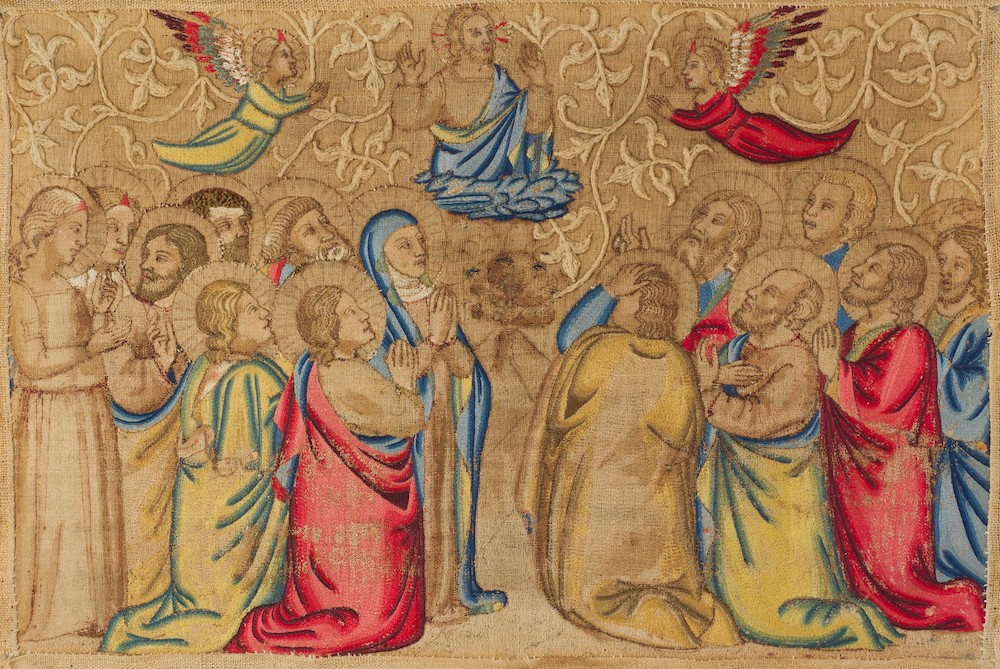
"The Ascension," 14th-century Italian embroidery (Metropolitan Museum of Art, The Cloisters Collection, 1960)
Rarely is something as simple as it seems. After Jesus invited Thomas to touch his wounds, all the disciples had become bona fide Christians, right? Not quite.
With the Feast of the Ascension (formally celebrated on a Thursday), we've completed 40 days of Easter — the same amount of time we spent in Lent. Unfortunately, in the Western church we don't give this season of joy the same kind of attention we give Lent. It's a little like our wedding traditions: after putting immense emphasis on preparing clothes and rings, flowers, attendants and the reception, the years the couple spends verifying the truth of their vows get treated like a ho-hum sequel. So, too, the Easter season: Even if we spent hours celebrating the Vigil, Easter Monday comes and most of us carry on as if we were living in ordinary time in a pre-Resurrection world.
It may be some comfort to know that we're not the first to do this — not by a millennial long shot. Listen carefully to the Ascension readings. Luke starts the Acts of the Apostles with great aplomb saying something like, "I already wrote a book that relates everything Jesus started to do and teach until the day he left." Most of our translations skip over that little word "started," but that's what Luke wrote. Luke seems to be imitating Mark whose Gospel opens with the title line, "The beginning of the Gospel of Jesus Christ." Mark was alerting his readers to the fact that everything that would follow in his Gospel was just the beginning. Their response would determine whether the beginning would evolve, radicalizing and sacramentalizing every dimension of human life or fizzle out in tame piety.
Luke gave us another half-cloaked expression of apostolic ambivalence when he said that the risen Lord "presented himself alive to them by many proofs." Luke seems to be goading us to ask why they needed many proofs? At the very least, he's telling us that it took a while for the disciples to become genuine apostles. Matthew makes the same point at the end of his Gospel when he says that when the disciples met Jesus on the mountain, they "saw him, they worshiped, but they doubted." Jesus' resurrection was more than any of them could grasp intellectually or even spiritually. They were confused because their experience seemed like proof and they were afraid to trust it.
Today's liturgy invites us to reflect again on the proofs we've contemplated during this Easter season: the symbol of the empty tomb that feeds our intuition that death can't be the end; a palpable experience of divine mercy and forgiveness; hearts burning as we hear the message of the Gospel; an insight that spurred us toward the lifestyle the Gospels call metanoia; or the courage and peace that come from the grace of trusting in God. These are the specific experiences we've reflected on during the past six weeks. Human life continually offers experiences that we can interpret as intuitive hints that give us reason for hope and motivation for seeking growth in our faith.
Advertisement
It would have been nice if Jesus had waited for his disciples to be certain — to know in their head and heart and gut just who he was and what it all meant. But Jesus didn't deal in the world of science and proofs; he operated in the realm of faith, a state of ongoing growth from doubt and fear to trust and peace. The disciples were very much like us. Even though they may not have been fully ready, the moment came for Jesus to hand his mission over to them. They didn't know everything, but it was time for them to begin to practice what Jesus had preached. Whether we take Matthew's rendition of Jesus' command to baptize or Luke's narrative of Jesus sending them to be witnesses to the whole world, these readings tell us that the time of discipleship had come to an end. The apostolic era was dawning. From then until now we are living in apostolic times, the era of practicing Christianity as experiential learning. The sending of the apostles inaugurated the last phase of Jesus' work of salvation.
Christianity may be simpler than we thought. Because Christianity is not ultimately a philosophy, a collection of dogmas, or a system of worship, we will not comprehend the good news except through becoming part of making it happen. We will understand Easter when we begin to live as if death really has been overcome. We will know Christ in us by allowing his grace to move us to give our lives for others. Then we will experience living in a post-resurrection world as part of a bona fide apostolic community in the making.
[St. Joseph Sr. Mary M. McGlone serves on the congregational leadership team of the Sisters of St. Joseph of Carondelet.]
